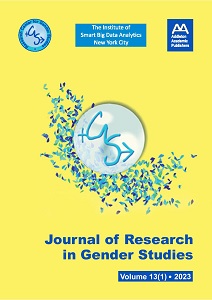Hyper-realistic Augmented Reality-powered Makeup Filters, Deep Learning-based Multimodal Emotion Recognition and Clothing Simulation Technologies, and Cognitive and Affective Algorithms for Negative Body Image and Objectified Body Consciousness
Hyper-realistic Augmented Reality-powered Makeup Filters, Deep Learning-based Multimodal Emotion Recognition and Clothing Simulation Technologies, and Cognitive and Affective Algorithms for Negative Body Image and Objectified Body Consciousness
Author(s): Luminiţa PopescuSubject(s): Gender Studies, Media studies, Aesthetics, Social Informatics, ICT Information and Communications Technologies
Published by: Addleton Academic Publishers
Keywords: augmented reality-powered makeup filter; clothing simulation; deep learning-based multimodal emotion recognition; negative body image;
Summary/Abstract: The aim of this systematic review is to synthesize and analyze aesthetic and affective technologies, bio‐inspired artificial perceptual and aesthetic self-monitoring devices, and generative artificial intelligence virtual try-on and beauty filter-based appealing self-presentation tools. In this research, prior findings were cumulated indicating that 3D augmented reality try-on and body-enhancing technologies, beauty apps and filters, and virtual try-on apps configure media perceived pressure, personal body image management, and social values and identities. A quantitative literature review of ProQuest, Scopus, and the Web of Science was carried out throughout May 2023, with search terms including “negative body image” and “objectified body consciousness” + “hyper-realistic augmented reality-powered makeup filters,” “deep learning-based multimodal emotion recognition and clothing simulation technologies,” and “cognitive and affective algorithms.” As research published between 2017 and 2022 was inspected, only 174 articles satisfied the eligibility criteria, and 23 mainly empirical sources were selected. Data visualization tools: Dimensions (bibliometric mapping) and VOSviewer (layout algorithms). Reporting quality assessment tool: PRISMA. Methodological quality assessment tools include: AXIS, Distiller SR, ROBIS, and SRDR.
Journal: Journal of Research in Gender Studies
- Issue Year: 13/2023
- Issue No: 2
- Page Range: 69-83
- Page Count: 15
- Language: English
- Content File-PDF

